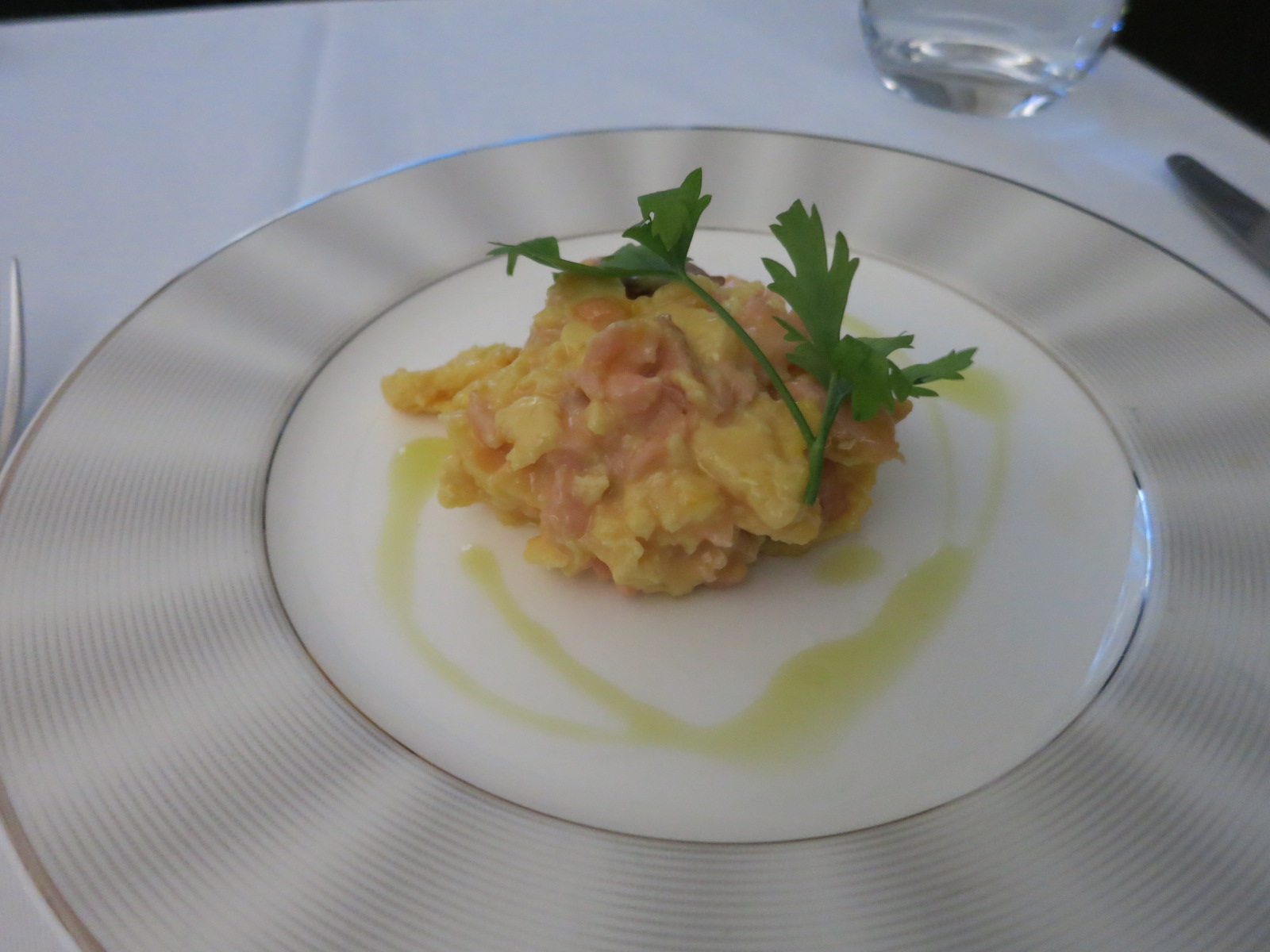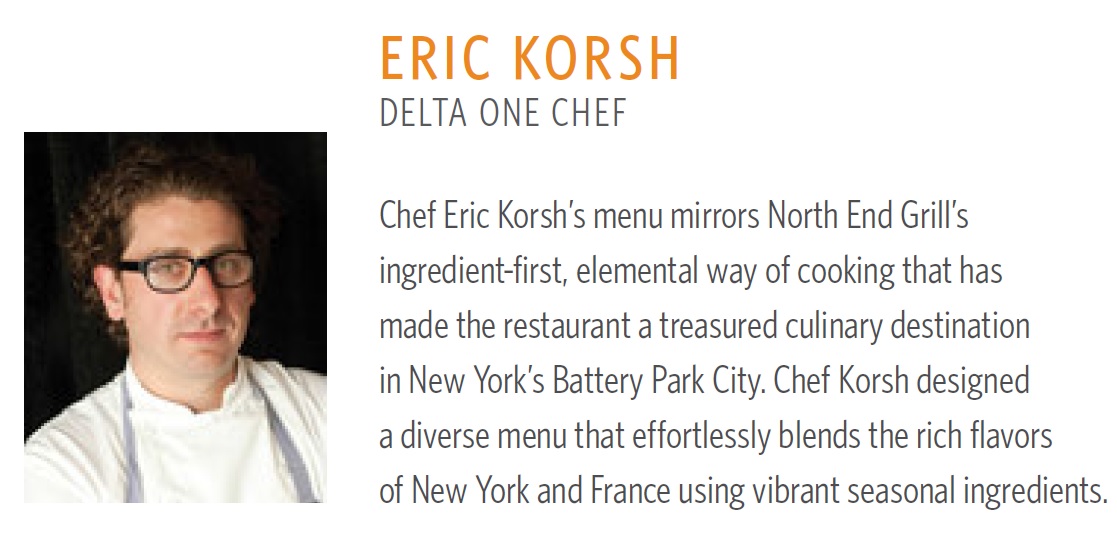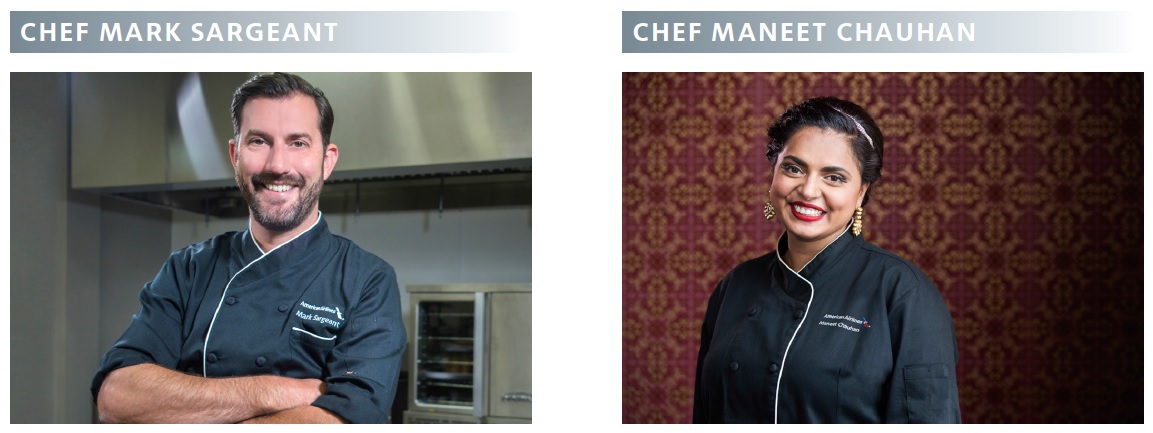Passengers complain that they aren’t served food anymore in coach most of the time. When I first started traveling for business (and certainly growing up), passengers complained that they were served food. Because airline food was a joke.
Back when United’s premium cabin meals were branded with celebrity chef Jacques Pepin they actually had economy meals which were chef-branded. United’s chef in economy was Sheila Lukins.
Thirty years ago of course United had an economy meals partnership with McDonalds — with happy meal toys (I have both Ronald McDonald and Grimace). United replaced the galley carts with ones specially-designed to keep the burger warm while the lettuce and bun stayed cool.

US airlines are never going to be a match for their foreign counterparts. On an Etihad flight from Abu Dhabi to New York JFK this year I ordered my eggs scrambled with smoked salmon. That wasn’t an option on the menu, but they had smoked salmon bagels, so I asked if they might use the smoke salmon in my eggs.

However with increased competition for premium cabin customers airlines have been:
- Investing more in their food
- Investing more in signaling their investment in food
Delta just announced that customers in their premium cabin on premium transcon flights and New York JFK to London, Brussels, Frankfurt, Paris, Zurich, Amsterdam and Dublin will get new meals by North End Grill’s Executive Chef Eric Korsh. This runs September 1 through November 30.

Dishes include Pink Sea Trout with Turnips and Pearl Onions and Short Rib Cannelloni with port, black truffle, wild mushrooms and parmesan as well as a desert Opera Cake.
This extends Delta’s partnership with Danny Meyer’s Union Square Hospitality Group, including Union Square Cafe and Marta.
Meanwhile American has brand new collaborations with two celebrity chefs for international premium cabin offerings.

Their meals are in effect but I had to develop a flow chart reading the press release, and then confirm my understanding with American.
Here’s where new celebrity chef dishes apply, in whole or in part:
- London-US [but not US-London] is the Mark Sargeant menu
- US-Europe (including US->London but not London-US) is Maneet Chauhan menu
- Europe-US gets some Mark Sargeant items including “soups, salads, appetizers and/or dessert”
- US-Latin America gets main courses by Maneet Chauhan (but no change to appetizer/dessert)
- Latin America-US no change
- Asia Pacific no change (although Sydney flights already have a much-improved meal service)
Last year United announced a collaboration with the Charlie Trotter Project. The late chef Charlie Trotter had been associated with United from 2007 through 2010, though those were some of United’s worst meals (customers used to say meals like the short ribs ‘gave them the Trots’).
One Mile at a Time argues that celebrity chefs don’t matter, if anything given limited catering budgets he wants airlines to invest more in the food not pay for a chef’s brand.
I’ve never understood the point of working with celebrity chefs. American says they’re “continuing to invest in the customer experience” by doing this. As most of you probably know, airline food budgets are very limited, which is why food quality on planes is often less than satisfactory.
…Presumably the only reason a well regarded chef would put their name on an airplane meal is because they’re being paid a huge sum of money for it. I just feel like that huge sum of money could instead be spent on raising the catering budgets so that better ingredients can be used, which would go a much longer way.
Judged that way, I’d agree and I think most people would. How the food tastes is more important than whose name is on it. But I’m not sure that’s the choice.
Airlines often invest more in food at the same time they brand with a celebrity chef. The celebrity chef is a way to capitalize on the food investment, to make people aware of it. It’s signaling. American’s Marcus Samuelsson meals five years ago were really quite good.

Customers don’t taste test a variety of meals. They don’t know how good the meal will be before they buy their ticket. They may not know what the older food tasted like.
Paying a name chef to associate with the airline meals is a way to announce the airline cares about its food. And if consumers believe the name chef cares about their reputation at all, they won’t put their name on the food unless it meets certain standards.
It’s also not going to be so cost prohibitive as to take away from food investment (versus signaling increased food investment).
- Take a hypothetical airline with 100 international and/or premium transcon flights in each direction. That’s 200 flights per day.
- Let’s assume 40 seats per flight just for round numbers.
- That’s 2.9 million premium cabin meals per year. If you paid your celebrity chef $1 million, that’s 34 cents of marketing per meal.
- Moreover, if you’re going to ramp up your meal investment by a dollar or two, you’re going to want to spend 34 cents to make darned sure your customers know it.
A celebrity chef doesn’t guarantee a good meal, in fact if a chef is putting their names on an airline meal you should downgrade your estimation of the chef. It means they’re more interested in the revenue stream from branding than maintaining quality for the simple reason that they cannot possibly replicate the restaurant quality of their means in the air, heated in an airplane galley, and plated by US airline flight attendants.
I revised my estimate of Danny Meyer downward when he opened Shake Shake at JFK and Delta started offering Blue Smoke barbecue. It was a signal that Delta’s terminal, and flights, were going to have better food while Danny Meyer’s restaurants would decline.
An airport is hard enough. Restaurants bring everything in through security when passengers aren’t going through the concourse (no just in time delivery), there’s almost no storage space, your knives have to be chained to the wall (and inventoried daily). You need to gear towards quick service and mass tastes, while not raising prices substantially over street level. And the actual service delivery may be done by HMSHost or Delaware North employees.
Translate to the airline catering kitchens, aircraft delivery, reheating, and altitude and you won’t get the true chef experience – rarely much supervised by the chef – in the air. But an airline licensing the chef’s name is trying to make a claim, at least, that they care more about the food — or more than they used to — and there seems to be a weak causal link between that and increased catering investment rather than trading off with that investment.


Do you remember the sad sandwiches in coach on American that had poor Marcus Samuelson’s name on it. He must have really needed the 34 cents per.
Very smart analysis
@beachfan I thought those sandwiches were actually pretty good (by the standards of coach buy on board).
Food has absolutely nothing to do with why I buy a ticket on one airline over another. I’d rather they spend the money on actually running the ops of the airline rather than investing in “improved meals” and “celebrity chefs.” Not that that is a real choice, but still. It’s an airline not a restaurant.
Since Delta “Comfort” is now considered its own class, and a premium one at that, will these meals be served to those pax, also?
Gary, I disagree (and largely agree with Lucky on this one). Catering is a cost center, and pennypinching US airlines aren’t going to invest much in it, branding or otherwise. I, like most everyone else, book my tickets on schedule, price and FF and a chef labeling on the slop that passes for food nowadays doesn’t change that one bit.
@KimmieA – no this is for “DeltaOne” business class
Good report and analysis! By the way, Virgin Atlantic has a separate menu and a step up from basic economy on their transatlantic ‘premium coach’ flight sections; but a step or two below Upper Class. I suspect Delta got the idea of improved service (not just wider seats) in Premium from Virgin; as it’s been a joke that everybody but Delta had that level it seemed. (I’m very loyal to Delta so tend to be on DL metal or a SkyMiles partner). And by the way in my biz travels I found AeroMexico more gracious and accommodating than KLM in AMS; though AirFrance was fine at CDG. So was Czech Airlines on a rare Prague-Lisbon flight.